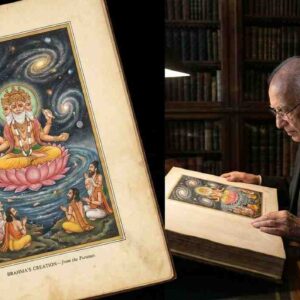A State Defined by Spirituality and Ethical Roots
Uttar Pradesh (UP), often regarded as the spiritual nucleus of India, is a land where religion has profoundly influenced not only cultural and social practices but also moral philosophies. From the ancient teachings of the Vedas and the Buddhist doctrines of compassion to the harmonious ideals of Sufi mysticism, religion has played a central role in shaping the ethical framework of UP’s society. However, as the state modernizes and diversifies, the intersection of religion and morality continues to evolve, presenting both opportunities and challenges.
Religious Foundations of Moral Philosophies in Uttar Pradesh
1. Hinduism: Dharma and Karma
- Core Principles:
- The concepts of dharma (righteous duty) and karma (cause and effect) are foundational to Hindu philosophy, promoting values like honesty, respect, and community welfare.
- Influence in UP:
- Temples in Ayodhya, Varanasi, and Mathura are not only spiritual centers but also guide moral behavior through teachings and rituals.
- Modern Impacts:
- Festivals like Ram Navami and Janmashtami emphasize virtues such as devotion, selflessness, and truth.
2. Buddhism: Compassion and Mindfulness
- Teachings of Buddha:
- Born in Lumbini, near the UP-Nepal border, Buddha’s philosophy of the Eightfold Path emphasizes right conduct, mindfulness, and compassion.
- Influence in UP:
- Sites like Sarnath, where Buddha gave his first sermon, remain focal points for Buddhist ethics, inspiring practices of non-violence and self-discipline.
3. Islam: Justice and Unity
- Sufi Mysticism:
- The Ganga-Jamuni tehzeeb of UP reflects the harmonious blend of Hindu and Islamic traditions, particularly through Sufi ideals of love, tolerance, and equality.
- Dargahs like Hazrat Nizamuddin in Amroha and Bara Imambara in Lucknow serve as spaces for ethical reflection and community service.
- Moral Teachings:
- The emphasis on zakat (charity) and justice in Islam encourages social equity and care for the marginalized.
4. Sikhism: Service and Equality
- Teachings of Guru Nanak:
- Sikh principles of seva (selfless service) and sarbat da bhala (well-being of all) have influenced UP’s ethics, particularly in regions with significant Sikh populations like Kanpur and Saharanpur.
Religion as a Guide to Social Morality
1. Family and Community Ethics
- Joint Family System:
- Rooted in religious teachings, the joint family structure emphasizes respect for elders, shared responsibilities, and mutual support.
- Charity and Social Service:
- Religious practices like zakat and temple donations foster a culture of giving and support for the underprivileged.
2. Justice and Conflict Resolution
- Panchayats and Religious Guidance:
- Rural panchayats often derive moral authority from religious teachings to mediate disputes and promote fairness.
- Community Harmony:
- Festivals and rituals celebrating interfaith traditions contribute to fostering unity and reducing conflicts.
3. Personal Conduct
- Rituals and Discipline:
- Daily prayers, fasting, and pilgrimages inculcate habits of self-discipline and accountability.
Modern Challenges to Religious Morality
1. Polarization of Religious Narratives
- Communal Tensions:
- Political exploitation of religious identities can distort moral teachings, leading to divisions rather than unity.
- Impact:
- The use of religious rhetoric for electoral gains risks overshadowing the ethical values of tolerance and compassion.
2. Generational Shifts
- Disconnect Among Youth:
- Younger generations, influenced by technology and global culture, often view religious practices as outdated, creating gaps in moral continuity.
3. Commercialization of Religion
- Festivals and Pilgrimages:
- Increasing commercialization has, at times, diluted the spiritual and moral essence of religious traditions.
Reinterpreting Religion for Contemporary Morality
1. Promoting Interfaith Dialogue
- Shared Values:
- Highlighting common ethical principles across religions—like honesty, charity, and community service—can foster unity and reduce divisive narratives.
2. Engaging Youth
- Modern Platforms:
- Utilize social media and digital tools to educate young people about the relevance of religious ethics in addressing modern challenges.
3. Balancing Tradition with Progress
- Adaptive Practices:
- Encourage reinterpretations of religious teachings to align with contemporary values of gender equality, environmental sustainability, and social justice.
4. Leveraging Religious Spaces for Community Development
- Temples, Mosques, and Gurudwaras as Social Hubs:
- These spaces can be used to promote education, health awareness, and skill development, reinforcing their role in ethical upliftment.
Conclusion: A Coexistence of Faith and Morality
In Uttar Pradesh, religion remains a powerful force in shaping moral philosophies and societal values. However, the evolving dynamics of modernization, political exploitation, and generational shifts present challenges to maintaining this influence.
By fostering inclusive interpretations of religious teachings and promoting shared ethical values, UP can ensure that religion continues to serve as a unifying and progressive moral compass. Balancing tradition with contemporary relevance is the key to preserving the state’s spiritual and ethical legacy for future generations.













